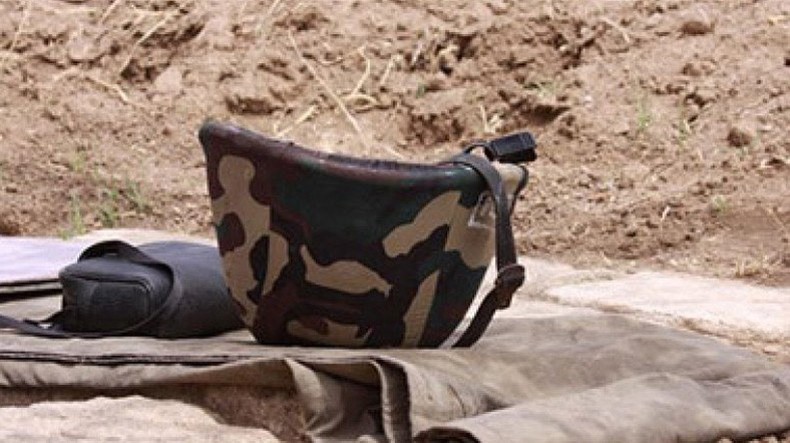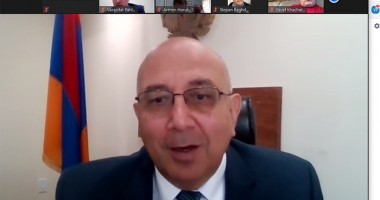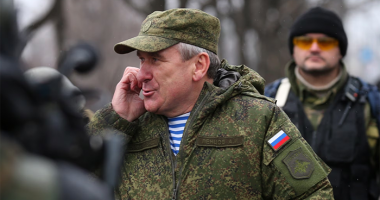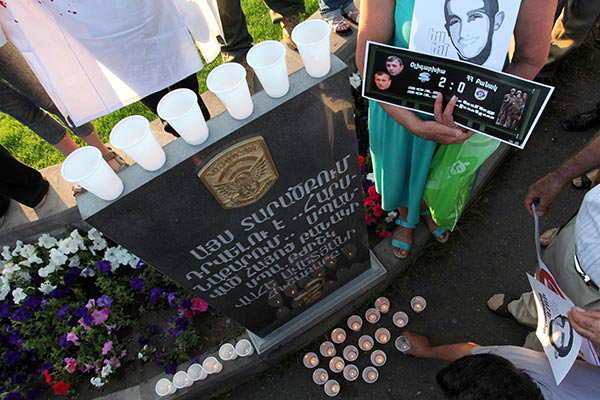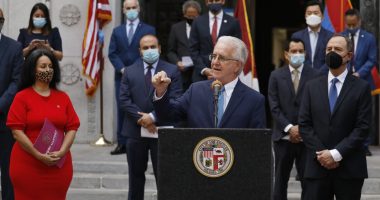BERLIN — German intellectuals, including German-Turkish film director Fatih Akin (The Cut) and other artists published an open letter directed to the German Chancellor Angela Merkel and Bundestag calling for the recognition of the Armenian Genocide.
In the open letter the artists call “to take a stand on 2 June and to refer to the crimes committed against the Armenian people as “genocide.” This is more than a historical period, more than an apology to the descendants of the victims. “Imagine you lived in Germany and the Holocaust would be denied – would that not be a continuation of the actual fact?”
Among the signatories of the open letter are Markus Rindt, Head of the Dresden Symphony Orchestra, German-Turkish-Armenian composer and guitarist Marc Sinan director of Kampnagel theatre in Hamburg Amelie Deuflhardand the general director of the Saxon State Library, Thomas Bürger.
The Bundestag is set to vote on a cross-party bill on Armenian Genocide on June 2.
Following is the english translation of the open letter:
Berlin / Dresden, 10 May 2016
Dear Madam Chancellor,
Dear Members of the German Bundestag,
Both the current German Parliament and its predecessors have remained silent for the past hundred years regarding the Armenian Genocide. However, partnerships don’t break down on the basis of what is said but rather due to what is left unsaid.
Today, we call upon you to take a firm stand on June 2, 2016, and call the crime perpetrated on the Armenian nation by its proper name: as genocide. After all, there is more at stake here than a mere historical classification or an apology to the descendants of the victims. Imagine for a moment that you lived in a Germany where the Holocaust was denied – would this not be tantamount to a perpetuation of the actual crime?
The denial of the Armenian Genocide lays the foundation for the violence of the present day: In 1915, the Armenians were labeled as terrorists and dispossessed of their belongings. In 2015 alone, upwards of 5,000 Kurds were – according to official figures – killed in Turkey due to alleged terrorist connections. Practically the entire center of the city of Diyarbakir was compulsorily expropriated.
Just a few days ago, President Erdogan warned that Armenia was playing with fire in Nagorno-Karabakh, bearing in mind that just over 100,000 Armenians still live in Turkey. We are of the firm persuasion that all these events have been facilitated by the systematic refusal of Turkey to face up to its history, and the fact that both its historical and present-day actions are met by silence on the part of the international community.
The author, Armin T. Wegner, had this to say about 1915: “(…) (I) went to the German Foreign Office, where they knew about everything, but stated that nothing could be done. I (…) had to powerlessly watch the horror unfold, the decimation of a nation. (…) The then Mayor of Aleppo, who was a man of great humanity and decency, sent a telegram to Talaat Pasha, the Minister of the Interior: Hordes of thousands upon thousands of Armenians have arrived. What are we supposed to do with them? And Talaat, the archenemy of the Armenians, telegrammed back: The goal of the deportations is extermination.”
To ensure that the German-Turkish partnership continues to flourish, we therefore call upon you today to uphold fundamental European values and issue a clear and unambiguous statement. You not only owe it to the descendants of the victims of the genocide, but are also obliged to do so in light of your own history and as a duty to Turkish civil society – regardless of ethnicity. Because ultimately, this is about closing the final chapter of the actual crime in order to usher in a peaceful Turkey of the future that is free, diverse and without fear.
-Marc Sinan, Composer and Guitarist
-Markus Rindt, Chief Executive & Artistic Director of the Dresdner Sinfoniker
along with
-Hillya Adak, Associate Professor of Comparative Literature at Sabanci University & Alexander von Humboldt Fellow at the Freie Universitaet Berlin
-Dogan Akhanli, Author
-Fatih Akin, Director
-Aysun Bademsoy-Petzold, Director
-Prof. Dr. Thomas Burger, General Director of the Saxon State and University Library Dresden
-Nuran David Calis, Director and Author
-Prof. Dr. Mihran Dabag, Direktor of the Institute of Diaspora- and Gen ozideresearch / Ruhr-Universitat Bochum
-Amelie Deuflhard, Chief Executive & Artistic Director, Kampnagel Hamburg
-Moritz van DUlmen, Head of Management, Kulturprojekte Berlin
-Regine Dura, Director and Author
-Dr. Cornelia Ernst, Chairwoman of the Die Linke delegation at the European Parliament
-Fatma Mite Gocek, Professor of Sociology, University of Michigan, Ann Arbor, USA
-Dr. Manuel Gogos, Publicist
-Lianna Haroutounian, Opera Singer, USA
-Dr. Elke Hartmann, Osmanist, Ludwig-Maximilians-Universitfit Munchen, and Chairwomen of Houshamadyan, Berlin
-Dr. Rolf Hosfeld, Author and Academic Director of the Lepsiushaus Potsdam Initative Anerkennung Jetzt
-Dieter Jaenicke, Chief Executive & Artistic Director, Hellerau – European Center for the Arts Dresden
-Dr. Raffi Kantian, Chairman of the German-Armenian Society
-Hans-Lukas Kieser, Professor of History, Universitfit Zurich and Centre for the History of Violence, University of Newcastle, Australia
-Annekatrin Klepsch, Mayor in charge of Culture and Tourism, Dresden
-Hans-Werner Krosinger, Director
-Christian Kuhnt, Chief Executive & Artistic Director, Schleswig-Holstein Musik Festival
-Sewan Latchinian, Artistic Director of Volkstheater Rostock
-Andrea Molino, Composer and Conductor, Musical Director of aghet, Zurich
-Thomas Oberender, Author and Chief Executive & Artistic Director of Berliner Festspiele
-Helmut Oehring, Composer and Author, Member of the Academy of Arts Berlin and Saxony
-Osman Okkan, Journalist and Filmmaker
-Christian Petzold, Director
-Tom Quaas, Actor and Director
-Frauke Roth, Chief Executive & Artistic Director, Dresden Philharmonic
-Jochen Sandig, Curator, Radialsystem V Berlin
-Elyse Semerdjian, Professor of History, Director of Global Studies, Whitman College, USA
-Prof. Dr. Bernd M. Scherer, Artistic Director, Haus der Kulturen der Welt, Berlin
-Vache Sharafyan, Composer, Jerewan, Armenien
-Dr. Eva-Maria Stange, SPD, Member of the Saxon State Parliament
-Dr. Valle Tachjian, Historian, Houshamadyan Berlin
-Mikis Theodorakis, Composer and Author, Griechenland
-Ilias Kevork Uyar, Lawyer
-Hortensia Volckers
-Murat Yildiz, Department of History and Armenian Studies Program, University of Michigan, Ann Arbor, USA
Translated by Patrick Breen
ww w.aghet.eu


